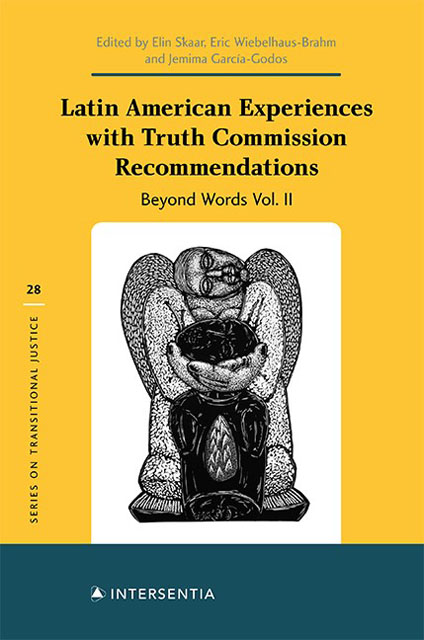Uruguay’s Commission for Peace: An Unfulfilled Experience?
Published online by Cambridge University Press: 19 November 2022
Summary
INTRODUCTION
This chapter examines the experience of the Uruguayan Commission for Peace (Comisión para la Paz), created 15 years after the end of the military dictatorship (1973–85). The Commission began its work in the context of the ongoing memory, truth and justice process in Uruguay, a context very different from that which prevailed in the first years after the reintroduction of democracy. We shall concentrate on an aspect rarely explored in scholarly studies of this truth commission: the recommendations drafted upon the conclusion of the Commission's work. Focusing on the eight recommendations in the final report of the Comisión para la Paz, we examine the specific factors and processes that affected their formulation, as well as the actors involved and the challenges encountered in their implementation.
This chapter combines documentary analysis of the Commission's final report with semi-structured interviews with relevant actors in Montevideo during the month of October 2016. We also draw on secondary material, including academic articles, organizational communiqués and CELS’ historical archives in our analysis of the Commission. In the chapter, before examining the recommendations, we begin by discussing the nature of the Uruguayan transition. Then, we examine the post-transitional context of the Commission's creation and operation, placing particular emphasis on the role played by human rights organizations, as well as the points of view of the different actors involved in the truth commission process. Access to monitoring reports, specialized articles, library material from the Luz Ibarburu Observatory in Montevideo, and UN reports have been useful in our assessment of the formulation and impact of the Comisión para la Paz recommendations.
THE URUGUAYAN TRANSITION: NEGOTIATION AND DEMOCRATIC AFFIRMATION
The context in which the Uruguayan Commission for Peace operated in 2000, 15 years after the conclusion of the dictatorship in 1985, should be understood in light of the transition. The political agreements negotiated in the transition from military rule to electoral democracy have to this day laid the foundations for the human rights agenda and the judiciary's ability to prosecute the perpetrators of human rights violations.
During the final years of the military dictatorship, the regime made various attempts at re-legitimizing and institutionalizing itself.
- Type
- Chapter
- Information
- Latin American Experiences with Truth Commission Recommendations: Beyond Words Vol. II , pp. 111 - 138Publisher: IntersentiaPrint publication year: 2022

